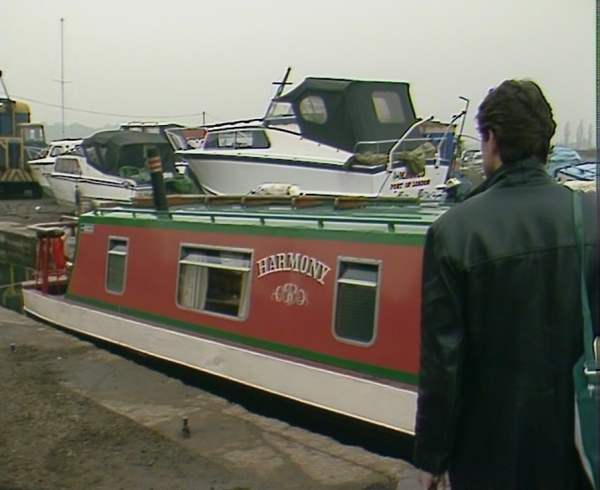Lomax’s quest for his son (not to mention finding out who framed him) is halted temporarily when he returns to London to attend his mother’s funeral. Afterwards, he resumes his targeting of Pember (Colin Jeavons) – a man who might be able to help him clear his name ….
Although the previous episode, Moving On, ended on something of a cliffhanger, the ongoing story halts temporarily as Lomax says farewell to his mother and attempts to rebuild bridges with his still somewhat bitter father (played by Patrick Godfrey).
Their scenes together help to bring the character of Lomax into sharper focus, although the picture that emerges isn’t an especially flattering one. Lomax Snr (he’s not given a Christian name, merely credited as ‘father’) remains comically disapproving about the flashy way Lomax dressed during his police days (Lomax tries to explain that he was undercover at the time, but that doesn’t seem to sink in).
Rather more telling is Loman Snr’s disapproval about his son’s philandering ways. Was this the reason why his wife left him? Lomax Snr also believes that having an ex-convict in the family is a source of great embarrassment (Lomax continues to protest his innocence, but his father – an experienced policeman of the old school – has heard it all before and doesn’t believe a word of it, even from his own flesh and blood).
Another fascinating moment occurs when Lomax wonders why his father didn’t let him see his mother during her final days. Lomax Snr’s initial response – he wanted his son to remember his mother as she was – is swiftly followed by a throwaway comment that she died of shame (because of Lomax’s conviction?) Lomax quickly picks up on this, but his father doesn’t seem to realise the import of his words (or decides he’s gone too far) and the conversation moves on.
They part on reasonable terms, although Lomax later admits that his previously held respect for his father has all but faded away. This strained father/son relationship seems to run parallel to what may be an equally fractious relationship between Lomax and Steve. It’s later revealed that Steve attended his grandmother’s funeral incognito. This confirms that he’s fine and had he wanted to speak to his father then he could have done so at any time during the last few months.
Later Lomax looks up Maureen (Bobbie Brown) for an afternoon of champagne, sex and Earl Gray tea. Their scenes together are, like the meeting with his father, designed to shine more of a light on Lomax’s character. And again it’s not flattering, as Maureen (shortly to be married) tells Lomax that she can’t see him any more – but wanted this one last time in order to use him the way he’s frequently used her.
After this mild battering to Lomax’s psyche, he gets back on the trail of Pember. More information is now shared with the audience – there were eight officers, including Lomax and Pember, involved in the operation which led to Lomax’s conviction. He’s convinced that Pember and someone else (as Pember seems to be too weak-willed to have masterminded things on his own) were responsible for framing him.
Lomax continues his psychological reign of terror (phoning up Pember in the middle of the night) although when they actually meet the dynamic between them has subtly shifted and Pember seems more in control. By this point, Pember has also made contact with Martin (Tony Doyle). If Colin Jeavons made a good career out of playing weaselly types then Doyle’s stock in trade was that of the implacable enforcer. The relationship between the two is skewed in Martin’s favour, although Pember (as long as he stays alive) has something of a hold over him.
And this is the point of the story where you realise that Pember’s a weak link who isn’t long for this world. Alas, Lomax is a little slower on the uptake and can’t prevent his murder. Given that he suspected Pember wasn’t working alone, surely he should have realised he was vunerable?
Ah well, that sets things up nicely for the second series. Especially when Lomax leafs through a series of photos of Pember and Martin and doesn’t react at the two of them together, which tells us that Martin isn’t known to him.
So across the course of six episodes we’ve seen two recurring plotlines developed, although neither have reached their conclusion. Hopefully the second series will offer closure. Time will tell …











